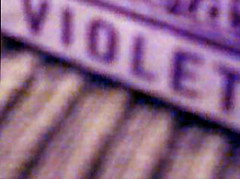V for Vendetta.
Seeing V for Vendetta last night with friends inspired a long evening of conversation about the politics of film, comics, and video games, and, of course, politics in general, which is in itself almost enough of a reason for me to see it. Anything that leaves me wanting to talk about it was well done, even if it wasn't exactly the movie I wanted.
I have complaints. V was too conversational, to voluble at the beginning when he should have been mysterious. I wasn't sucked into the world of the film immediately; I would have liked to see more setting established. Evey and V aren't the only things going on in this world, and I would have liked to see more of that immediately, and not just through the TV. Some of the editing was difficult, and not necessarily good.
But by the end, I was completely wrapped up in the film. It did a wonderful job of tying all the plotlines and metaphors together, building to a truly stunning climax. It was a fairly faithful rendition of the graphic novel, editing some subplots out for the sake of clarity, playing up the ties to the contemporary situation, but for the most part following the plan layed out by Alan Moore in the graphic novel.
Moore, however, wants nothing to do with the film. He had his name redacted and refused a share of the profits. He has reasons to be angry, some of which are explained in this New York Times article. In addition to his disputes with DC Comics, who do indeed make a habit of stripping their authors of any intellectual property rights, Moore's objections to film adaptation stem partially from his commitment to establishing graphic novels as a valid and complex medium in their own right, rather than just prototypes for film. His worst fears about film might be evident in an examination of From Hell and how completely unrelated to Moore's dark, literate graphic novel the Hollywood movie turned out to be.
I've read V for Vendetta and I must say that the film in some ways felt more clear, just a little easier, but for the most part very similar. I definitely felt that I knew what was coming every moment. Both were intensely literate, dripping Shakespeare quotes and images of famous artwork, and not at all subtle, trying to force the audience into some realization about life, politics, and revolution.
But will people see this movie? Will they think about it beyond the big explosions? Why aren't people angry? Can they really think it's just a movie, rather than a much-needed political speech of an extreme variety? Perhaps the New York Times Review is an indication, dismissing it all too easily in a show of wit rather than serious consideration. The only sentence in the entire review I agree with is that it "never manages to make this Goth dystopia pop." Although perhaps this one at least deserves some consideration: "The more valid question is how anyone who isn't 14 or under could possibly mistake a corporate bread-and-circus entertainment like this for something subversive." Like this sentence, the whole review is haughty and superior, not for a moment giving the movie credit as a political statement. And perhaps the reviewer is right that within the system you can't possibly overturn it and this film is indeed motivated by profit as much if not more than by art or politics. But I think that the people dismissing this as a facile political statement are wrong. It's saying something that needs to be said, in the 1980s, now, and again: the government is wrong, DO SOMETHING.
Elizabeth McGovern
-
Elizabeth McGovern takes on not just Ava Gardner but the very idea of
biography in her play, Ava: The Secret Conversations. It was an absolute
treat to cha...
1 week ago

0 comments:
Post a Comment